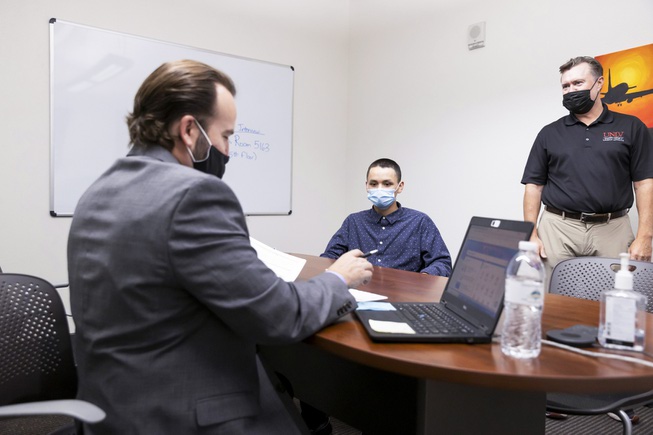
Courtesy
Brandon Perry, left, Director of HR Initiatives with MGM Resorts International, and Robert Ulmer, right, Dean of the Greenspun College of Urban Affairs at UNLV, help Foster Youth Initiative participant Jorge Garcia, center, with his job interview skills Aug. 2, 2021. (Lonnie Timmons III/UNLV Photo Services)
Saturday, Nov. 27, 2021 | 2 a.m.
UNLV and one of the area’s biggest employers are partnering on a job training program to help former foster youth overcome the long odds of their circumstances.
The MGM Resorts Public Policy Institute at UNLV’s Greenspun College of Urban Affairs is behind the Foster Youth Initiative, which is gearing up to help recently aged-out foster care kids get interpersonal and financial stability after they stop being wards of the state at 18 — an age when many young people in conventional homes are still in high school or living with their parents.
About 4,300 children are in foster care in Nevada. About 3,000 of them are in Clark County. It’s a large group that doesn’t get much support but needs it, said Robert Ulmer, the Greenspun College dean.
“The outcomes for foster youth are really challenging,” Ulmer said. “Twenty percent will be homeless by 18, a quarter suffer from PTSD or will, a quarter won’t graduate from high school, half will be unemployed by 24 and only 3% will get a college degree.”
They help the participants describe their life experiences as an asset and how to design a stable adult life drawing on their adaptability. Half a dozen young people went through the first cohort this fall and another 15-20 will start up in January. Future groups could be the ones to land jobs at an MGM Resorts International property.
Robert Nailen learned about the initiative through a county social worker who helps aged-out foster kids transition to adulthood.
Nailen, the eldest of five and a Centennial High School graduate, said his mother was just too immature to be a parent, and he was in and out of “the system.” He was close to 18 when he last went into foster care and chose to ride it out rather than go back to his mom.
He is now 21 and as introspective as a man with a couple more decades of life experience.
He said he learned about corporate culture and the importance of professional presentation — but also that high-ranking executives are just regular people. “That’s something big,” he said.
Wanda Smith-Gispert, vice president of workforce development for MGM, said the company has the resources to prevent people from falling through the cracks in Las Vegas.
An entry-level, part-time job with MGM offers perks that can help young people with limited resources hold onto a job, she said: things like free food, employee locker rooms and showers, and a clean uniform every day. After six months, MGM will help pay college tuition.
A young adult still in their teens or just hitting their 20s might start at a gift shop, arcade or quick-serve restaurant, or in a behind-the-scenes role like the dry cleaning and tailoring operation that takes care of employee uniforms, but every job has a pathway within the organization or industry, Smith-Gispert said.
She refers to herself as an example — she did entry-level front desk, housekeeping and dishwashing jobs for other hospitality companies before coming to MGM and climbing the human resources ladder.
MGM doesn’t guarantee every program participant a job, but Smith-Gispert feels confident the program can prepare them for some kind of hospitality work.
Ulmer said Clark County Family Services identifies candidates for the program. Once at UNLV, program officials help them set up a profile on LinkedIn, take professional headshots, and polish their interview skills.
“Our job is to get them thinking about a future that is optimistic, that has opportunities for them. We know that for foster youth, the No. 1 predictor of their success is their ability to develop and maintain relationships,” he said. “We’re working with them on interpersonal skills, managing conflict but also building their employment skills.”
Smith-Gispert said foster youth have a fundamental work ethic that stems from their challenging childhoods. A high school or college student with a more stable family life might take a part-time job for pocket money. A foster youth knows their job is to keep their head above water, and will take work seriously as an opportunity for self-sufficiency and self-improvement.
“They come to work like their life depends on it, and it does,” she said.
